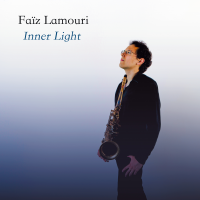Home » Jazz Articles » Interview » Tamar Osborn: From Kalakuta To Collocutor: New Directions In Jazz
Tamar Osborn: From Kalakuta To Collocutor: New Directions In Jazz
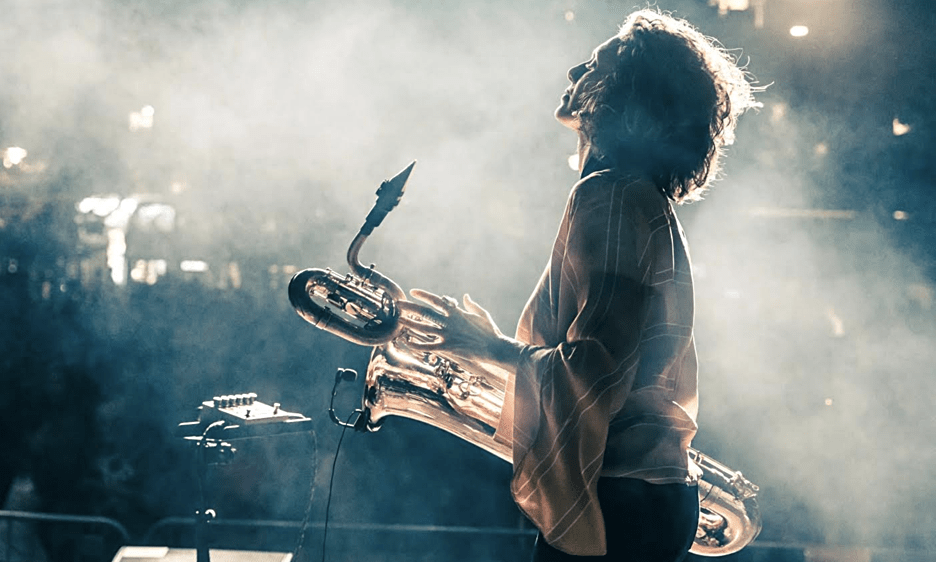
Courtesy Greg de Wode
The process of grieving for my mum happened when the news was full of refugee crises and the civil war in Syria. And also Brexit happened and the whole rhetoric around it seemed to open this door of xenophobia and racism, letting it bubble to the surface. 'The Angry One' is really a scream of frustration against all of that.
—Tamar Osborn
Collocutor is three albums old. It began as a studio project with the album Instead in 2014 and then became a live band, releasing The Search in 2017 and Continuation in 2020 (all on On The Corner). There is a clear strand running through them: epic cultural breadth, adventurous arrangements, acknowledgement of the importance of rhythm and percussion, a preference for modes rather than chord changes, and, perhaps most importantly, an uplifting, healing vibe.
When she was eighteen, Osborn, then playing alto saxophone, enrolled on the joint jazz and classical music degree course at London's Guildhall School of Music & Drama. She graduated in 2000, by which time she was playing the baritone. After a few years touring the UK in musical theatre pit-bands and playing alongside turntablists on the emergent hipster scene around London's East End, she spent a year in Malaysia and India, working as a saxophonist and immersing herself in local musics.
In 2009, Osborn joined London-based Dele Sosimi's world-class Afrobeat Orchestra (Sosimi has been musical director of Femi Kuti's The Positive Force and, before that, was a keyboard player in Fela Kuti's Egypt 80). She is still a member. In 2010 she became part of the stage band for a London run of Fela! The Musical, later forming the Afrobeat band, The Fontanelles, with fellow alumni. The rebellious, free-thinking, all-nations spirit of Fela Kuti's Kalakuta Republic is reflected in her work.
Since then, Osborn's musical palette has been further enriched playing with Nick Woodmansey's Emanative, with whom she recorded the outstanding beyond-jazz album Earth (Jazzman, 2018), and with Sarathy Korwar's band, with whom she recorded the modern day Indo-Jazz classic My East Is Your West (Gearbox, 2018). She has also worked with Maisha, Josephine Davies' Big Band and Lokkhi Terra meets Dele Sosimi's Cubafrobeat project. And that is just scratching the surface. In 2018-19, she took part in choreographer and dancer Akram Khan's Xenos world tour.
In this interview, Osborn talks about all this and more. She concludes by running the voodoo down on six of her all-time favourite albums.
All About Jazz: How did you come to choose the baritone as your main instrument?
Tamar Osborn: This might be a slight twisting of my memory, but I think I first came across the baritone when I was made to play it in a saxophone ensemble at Guildhall. I struggled with it at first. It's quite a different beast to the alto and the tenor. But I remember one particular big band project where I had this sense of being part of the saxophone section and the trombone section as well and also doubling up the bass sometimes. I loved being in that place in the ensemble. And the weight of the bottom end of the instrument, that's a lot of fun, too. If I'm honest there was also a more calculated side in choosing to focus on the baritone: not a lot of people played it and not a lot of people owned one, so it seemed like a sensible thing to do. Of course, I had also grown to really love the sound of the instrument.
AAJ: Did you ever try a bass saxophone?
TO: Very, very briefly. They're great. It's just a little too heavy for me physically.
AAJ: When you left college did you head towards jazz or classical?
TO: Neither actually. At first I did a lot of musical theatre, playing in pit bands, touring the UK. I'd always been interested in theatre and had done some musical theatre in youth companies. It's coincidental, but when I started playing in Fela! The Musical, working with actors and dancers was no big leap.
AAJ: A few years after graduating from college, you spent a year or so playing in Malaysia and India. How did that come about?
TO: In the early 2000s, I did quite a lot of playing alongside DJs in bars and clubs around Old Street. They'd play the turntables and I'd improvise. One of them recommended me to a colleague who was looking for people to work with him on a residency in Kuala Lumpur. That was in 2004. I took the baritone and a soprano because I knew that playing baritone for hours on end five nights a week would probably do me some physical damage. This guy would play absolutely every sort of music so it was another strand of training, being able to play with any style or genre that gets thrown at you. While I was there, a friend who was travelling came to visit and put me in touch with someone in India it would be interesting to hook up with. When the contract ended I got in touch and ended up in Kolkata. The group was a combination of Indian classical and Western jazz musicians. They were incredible musicians, one of them was Ravi Shankar's tabla player. So I was a little out of my depth. But they were really welcoming and I switched my ears on. It was a steep learning curve, an absolutely amazing opportunity to learn about Indian classical music, albeit informally.
AAJ: It stood you in good stead when you later started working with Sarathy Korwar.
TO: Working with Sarathy really tied in with those experiences: it was the kind of music and an approach that the time in Kolkata had woken me up to. Doing Sarathy's My East Is Your West is up there with one of my favourite gigs ever.
AAJ: Did you do much other travelling in the early 2000s?
TO: When I came back from India I went to Cape Town and around Namaqualand with my mum. She was from the mixed race community in South Africa. So when I was growing up I was always aware of the wider world. My mum used to joke that I had United Nations running through my blood. My dissertation at college, for instance, was about the influence of expatriate South African musicians on the UK jazz scene. It took in things like Brotherhood of Breath and District Six. All these elements have fed into the course my own music has taken.
AAJ: In 2009 you joined Dele Sosimi's Afrobeat Orchestra. How did that come about?
TO: When I got back to London from South Africa, I started a band which had influences from funk plus bits from Afrobeat and Afro-Cuban music. And through that a friend who was in Dele's band introduced me to him when he was looking for a baritone player. I sat in for one gig... and I've never left. Thanks Dele for letting me stay. And playing with Dele of course led to Fela! The Musical.
AAJ: And then Fela! led to The Fontanelles.
TO: Yes, and that got me back into writing again. But in writing for The Fontanelles I realised that some of the music I wanted to write wouldn't suit a large Afrobeat ensemble. That realisation was the genesis of Collocutor.
AAJ: How do you feel Collocutor has evolved over the course of its three albums?
TO: The first album, Instead, which was recorded at the end of 2012, has a more tangible African influence, partly because of having Afla Sackey as one of the percussionists, partly because it's closer in time to Fela!, which had in turn led to the Africa Express train trip in 2012. That was another incredible experience: eighty or so musicians from all over the world on a train together, stopping off at I think it was six British cities doing small pop-up gigs in community spaces and big concerts with major African artists. Meeting the Krar Collective on that tour was part of my realisation that modal writing suited me more than structured harmonic writing.
AAJ: How would you say The Search followed on from that first album?
TO: When we recorded Instead we hadn't performed live, it was a studio project. By the time we started gigging, Afla had become incredibly busy as a freelance musician and with his own band and I had to make a choice whether to keep the personnel the same as on the album, which would mean frequently having to find a dep for Afla, or have a lineup change—which is what happened. Magnus Mehta came into the band and brought in very different but equally creative and interesting percussion. The way he and Maurizio Ravalico worked together formed a huge part of the backbone of The Search. Then there were the three "Conversation" tracks—my writing had been quite specific up until then, but I realised I had a band full of amazing improvisors and I wanted to give them more room. So when I was writing The Search, the "Conservation" tracks were a way to open up that space for them on the record.
AAJ: And then Continuation brings a further development in the band's sound.
TO: Yes. Firstly, it's made with a slightly smaller band, a five-piece. This was partly a practical thing: there didn't seem to be much budget around for people to book a seven piece band and so a lot of the gigs we were getting had to be for quartet or quintet lineups, which meant I had to rework the material. It would usually be for one percussionist and two horns rather than two percussionists and three horns. So there was practical thought about how do we actually do more as a live ensemble.
AAJ: The narrative suggested by the track titles on Continuation is also different.
TO: It is. The Search was a journey of relocation—self discovery, new beginnings, making conscious changes and looking forward. It wasn't about a specific situation, more an open narrative about choosing to make changes in your life and being open to new experiences, something which hopefully would resonate with audiences. The narrative was kind of accidental: the music wasn't written in the album order, but naturally fell into this story arch as the pieces were finished. As far as I can remember, "Disappearance" was the only piece specifically composed to fit the narrative, which made it the hardest to write.
Continuation, on the other hand, is an album about coping with grief after my mum passed away. From that point of view it was a very necessary album for me to write, to be able to process those emotions. And musically, it drew on a lot of experiences I'd had over the previous few years, like joining Sarathy's band and doing things like a recreation of Miles Davis' On The Corner live at the Total Refreshment Centre with a version of Collocutor plus Sarathy. There was structure in those lineups but also freedom to go away from that structure. That was something I wanted to bring into Collocutor a lot more. On "Pause" for instance, I had a couple of elements I really liked but everything I was trying to write around them didn't work. Then one day I thought, why do I need to write anything else? Why not just hand the band these elements and take it from there? Similarly with "Deep Peace." It has four basic elements and the whole point is that it changes every time we play it.
AAJ: The vibe of "The Angry One" would seem to be about more than processing personal grief, it seems to be more societal. It's the shortest track on the album but it has huge impact.
TO: It's both those things really. The process of grieving for my mum happened when the news was full of refugee crises and the civil war in Syria and what was called The Jungle [a refugee camp in Calais]. All these social crises were present as well. Grieving for my mum gave me in a very, very, very small way an insight into what these people who have lost absolutely everything must be going through. I found myself looking at their circumstances and thinking: how do you deal with not only losing your loved ones but losing your home, your whole way of life, losing your country, and trying to pick yourself up and still find hope and look forward. And also Brexit happened and the whole rhetoric around it seemed to open this door of xenophobia and racism, letting it bubble to the surface. "The Angry One" really is a scream of frustration against all of that.
TAMAR OSBORN: SIX ALL-TIME FAVOURITE ALBUMS
Narrowing it down to six albums is hard. I've ended up, partly consciously, partly not, choosing six albums that I first encountered in my teens and twenties and which still have the same impact on me now, twentyish years later. In no particular order they are....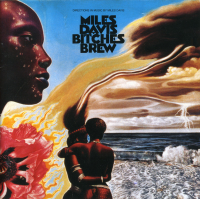 Miles Davis
Miles DavisBitches Brew
Columbia, 1970
I first heard this in the library at Guildhall not long after starting my degree. I put it on and it blew my tiny little eighteen year old mind. I could sink into this soundscape and just drift off. It would be quite a feat drifting off to it now, to find it so relaxing that you could fall asleep to it. What an incredible work. Understanding the level of editing and production that went into it only came later. My ex had a whole book on how the album was edited. The complexity of editing an album like that back in the age of tape is just astonishing. The playing itself is incredible but then to take it and hone it into the finished work is an amazing creative achievement.
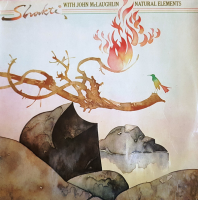 Shakti With John McLaughlin
Shakti With John McLaughlinNatural Elements
Columbia, 1970
There's a link to the last album here, of course, but I came to this one some years later. I was introduced to it by friends in India. To me, it's still one of the best meetings of two traditions you can listen to. You can hear the mutual respect, the communication and the joy of playing together. Of course, the actual music is really wonderful, too.
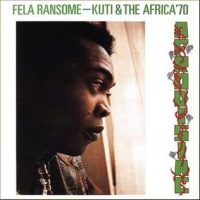 Fela Ransome-Kuti
Fela Ransome-Kuti Afrodisiac
EMI, 1973
There has to be a Fela and I've chosen this one because it is one of the first Fela albums I bought. It was in a shop where I used to buy loads of reduced price albums just to be able to explore new sounds. I've got to know many other Fela records since I first heard this but it is still up there as one of my favourites. There's so much about it which is just great: the writing, the groove. Fantastic.
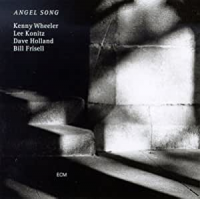 Kenny Wheeler, Lee Konitz, Dave Holland, Bil Frisell
Kenny Wheeler, Lee Konitz, Dave Holland, Bil Frisell Angel Song
ECM, 1997
I got to see this live, I think at The Barbican while I was a student down the road at Guildhall. It's absolutely magical. The album still really transports me. Kenny Wheeler's writing is always amazing, and his quite mournful tone in combination with Lee Konitz's alto alongside Bill Frisell's guitar, which is actually on the bright side quite often, makes for a beautiful, beautiful album.
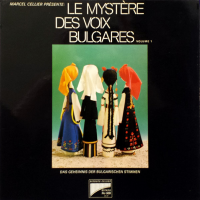
Le Mystère des Voix Bulgares
Volume One
Disques Cellier, 1975
I can't remember exactly when I first heard this album, but vocal music translates very well on to the saxophone and I remember doing some projects when I was young, doing medieval sacred music on saxophone. The way the writing translates on to the four different saxophones works brilliantly. So something in the writing on this album really resonates with me: the style of ornamentation, the harmonic clusters which expand and contract and sometimes resolve and sometimes don't or resolve in a completely unexpected way. It all informs how I write for the horns in some of Collocutor.
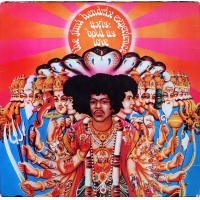 Jimi Hendrix Experience
Jimi Hendrix Experience Axis Bold As Love
Track, 1967
Jimi Hendrix has been with me since my mid teens. A friend at school gave me a cassette with all his classic albums crammed on to it and for years I didn't know which tracks belonged to which album. I think this is probably the one I've listened to most. Having that sonic presence in my mind from such a young age must be the reason I love delay and complex panning as ways of messing with your perception of space when you're listening to something. I think it all goes back to what Jimi Hendrix was doing back in the late 1960s. I've gone through periods when I haven't listened to him for a few years and then I'll put an album like this back on and I'm just... wow. So creative, so innovative. It's still as fresh to me as it was when I was fifteen.
Tags
PREVIOUS / NEXT
Tamar Osborn Concerts
Support All About Jazz
 All About Jazz has been a pillar of jazz since 1995, championing it as an art form and, more importantly, supporting the musicians who make it. Our enduring commitment has made "AAJ" one of the most culturally important websites of its kind, read by hundreds of thousands of fans, musicians and industry figures every month.
All About Jazz has been a pillar of jazz since 1995, championing it as an art form and, more importantly, supporting the musicians who make it. Our enduring commitment has made "AAJ" one of the most culturally important websites of its kind, read by hundreds of thousands of fans, musicians and industry figures every month.



